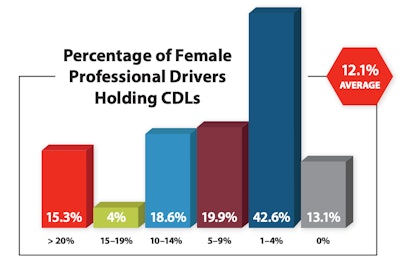
The transportation industry continues to become a more diverse and inclusive place, according to a new survey released today by a leading organization. The survey also shows women continue to play important roles in trucking, from top levels of management to operations, including serving as professional drivers.
The Women In Trucking's 2023 Index found 56.4% of respondents have formal diversity and inclusion policies in place and another 19.3% of companies are in the process of creating them. Last year's survey found 45.5% of respondents had such policies in place.
According to the WIT survey, "'Workplace diversity' is an umbrella term for strategies that recognize and accommodate the differences in ethnic, cultural, socio-economic backgrounds, religious beliefs, sexual orientation, disabilities, family responsibilities, life and work experience in the workforce."
The survey also charted the roles women plan in the industry. The WIT Index's findings found:
- C-Suite (Senior) Executives 31.6%
- Company Leaders 36.9%
- Females Serving on Boards of Directors 28.4%
- Women in HR/ Talent Management 74.6%
- Women in Technician Roles 7.5%
- Women in Professional Driver Roles 12.1%
- Women in Dispatcher Roles 43.5%
- Women in Safety Roles 41.6%
According to the WIT, there has been a significant increase in the number of female truck drivers for the past five years. This year’s WIT Index shows an average of approximately 12.1% of professional drivers are women, a slight decrease of 1.6% from last year’s Index.
 Women In Trucking
Women In Trucking
According to WIT, 350 organizations reported their gender diversity statistics in the 2023 WIT Index survey. A majority of them (51.8%) have for-hire fleets or private fleets as part of the organization’s operations. Of those respondents representing organizations with fleet assets, 41% were reporting on behalf of motor carriers of various types (full truckload, less-than-truckload, refrigerated, flatbed, expedited and liquid) and 10.8% were reporting on behalf of manufacturers, retailers, distributors, and other company types with private fleets. Another 14.2% of respondents were reporting on behalf of intermediary companies, including third-party logistics companies, truck brokers, and intermodal marketing companies.
For more information on the WIT Index and to download a full executive summary of the 2023 WIT Index findings, visit https://www.womenintrucking.org/index.











